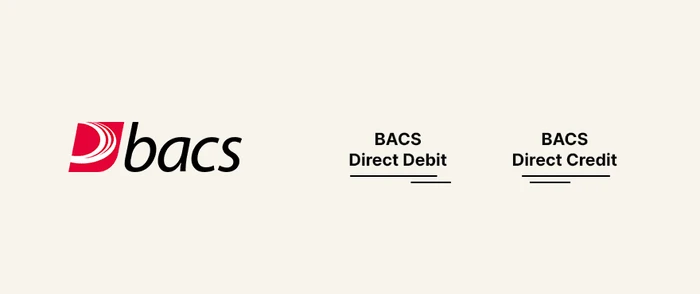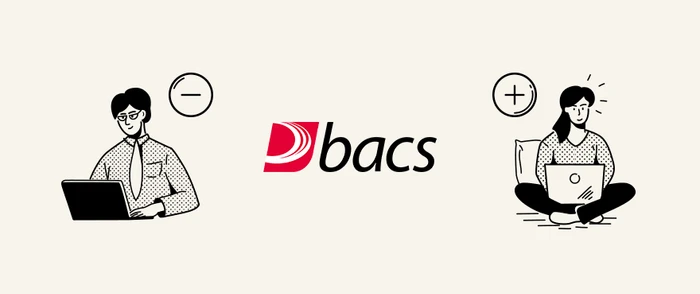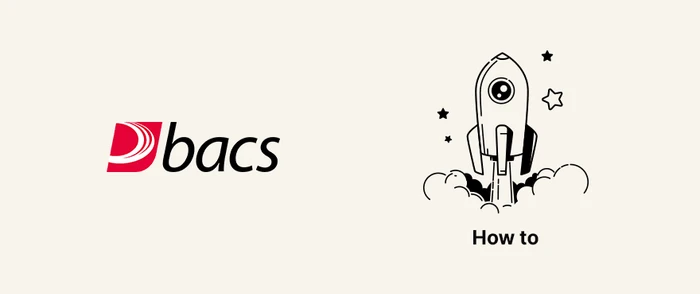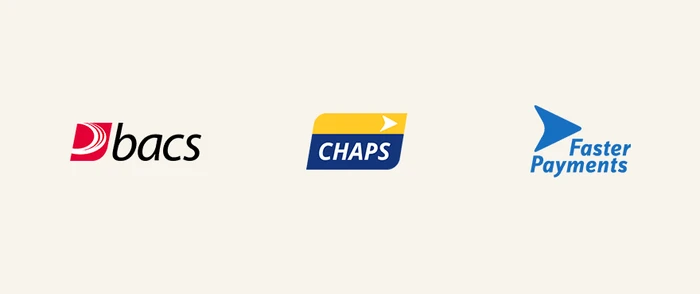What is BACS? Full Guide to BACS payments
Navigating the financial world can be complex, but understanding BACS payments can simplify transactions for businesses and individuals alike in the UK. Let's dive deep into this significant aspect of the UK’s financial ecosystem.
What is BACS payment?
A BACS payment is an integral part of the UK's financial landscape, serving as a trusted electronic mechanism for transferring money between accounts. It originates from the acronym "Bankers' Automated Clearing Services". Although BACS is one of the oldest payment systems in the UK, it is still a preferred choice for many businesses and individuals.
What are the two main BACS payment types?

The two main types of BACS payment methods, integral to UK banking transactions are BACS Direct Debit and BACS Direct Credit.
BACS Direct Debit payments
Bacs Direct Debit is a mechanism for automated payments used by banks and financial institutions in the UK to automatically collect payments from a bank account upon authorisation. It's frequently used for:
- Regular Bills: Many utility companies, telecom providers, and other service-based entities use Direct Debits to collect monthly or quarterly payments from customers.
- Memberships & Subscriptions: Gyms, magazines, and online streaming services might collect their subscription fees through Direct Debit.
- Loans & Mortgages: Some financial institutions might use Direct Debit to collect loan or mortgage repayments.
The process requires the payer (the individual or entity making the payment) to provide a mandate, usually a signed form or online agreement, granting permission for the payee (the entity receiving the payment) to collect varying amounts from their bank account. The payer's bank then processes these payments based on the payee's requests.
BACS Direct Credit
BACS Direct Credit is an electronic payment made by banks and financial institutions in the UK to transfer money directly from one bank account to another. They are commonly used for:
- Salary Payments: Many employers in the UK use BACS Direct Credits to pay wages to their employees directly into their bank accounts.
- Pensions: Many pension payments are made this way, directly into the retiree's bank account.
- State Benefits & Tax Credits: The government and related entities often use this method to deposit benefits and tax credits directly into recipients' accounts.
The process involves the payer (or originator) sending a list of payments to their bank, which then processes the payments through the BACS system. The money is then deposited directly into the recipients' bank accounts, typically within three working days.
What is a BACS Service User Number and do I need it?
A BACS Service User Number (SUN) is a unique identifier, comprising six digits, assigned to businesses and organisations intending to initiate BACS Direct Debits or BACS Direct Credits within the UK's BACS payment system.
This number facilitates efficient processing within the BACS framework and ensures transparency by appearing on the bank statements of recipients, making it easier to trace and authenticate transactions.
Now, if you're pondering over the necessity of a SUN for making a BACS payment, here's the clarity: for occasional or personal BACS payments, securing a SUN isn't mandatory. However, for businesses aiming to collect regular payments through BACS Direct Debit or dispatch regular BACS Direct Credit payments, a SUN becomes essential.
For individuals and entities looking to make BACS payments without a SUN, the process remains straightforward. They can execute these transactions through their respective banks which manage the intricacies of the BACS system on their behalf, ensuring seamless, hassle-free electronic payments.
How much does a BACS transfer cost?
The cost of a BACS transfer can vary depending on whether you're a business or an individual and the specific bank or financial institution you use. Generally, BACS payments for personal use are often free or have minimal transaction fees, especially for standard processing times.
Here's a breakdown of potential fees associated with BACS transfers:
Personal Accounts: Many banks do not charge fees for transfers made from personal accounts. They are often included as part of standard account services.
Business Accounts: For business accounts, fees for BACS payments may apply. While costs vary among banks and account types, the fees are generally low, approximately £0.50.
Bulk Payments: Businesses that send a large number of BACS payments, such as payroll or supplier payments, may negotiate lower fees with their bank for bulk processing.
Third-party BACS Services: Businesses sometimes opt for third-party facilities management services to handle BACS payments, which incurs additional fees.
To get accurate information about BACS transfer fees for your specific account and situation, it's advisable to contact your bank or financial institution directly.
How long does a BACS payment take?
A BACS payment typically takes 3 working days to process in the UK. Initiated on the first day, processed by banks on the second, and cleared into the recipient's account on the third day.
What is the maximum amount you can pay using BACS?
The maximum limit can vary depending on your bank, your specific account type, and your banking history. Some banks may have daily or per-transaction limits in place for security reasons. For example, daily limits for individuals can be £25,000 (e.g., HSBC, 2023) while for businesses – £50,000 per transaction and £100,000 per day (Barclays, 2023).
Advantages and Disadvantages of the BACS Network

BACS Network is a great choice for transactions but understanding its pros and cons will help you determine if the network aligns with your specific payment requirements.
Advantages of the BACS Network:
- Cost-Efficient: BACS payments are typically cost-effective, especially for businesses that frequently make bulk payments. The fees associated with BACS transfers are often lower than other payment methods.
- Safety and Security: BACS is a highly secure network with stringent protocols in place to protect transactions and sensitive data.
- Convenience: BACS allows for automated recurring payments, making it convenient for businesses to manage payroll, supplier payments, and regular bills without manual intervention.
Disadvantages of the BACS Network:
- Processing Time: BACS payments are not immediate. They typically take three business days to clear, which may not be suitable for urgent transactions.
- Limited Transaction Types: BACS is primarily designed for simple credit transfers and direct debits. It may not support more complex payment needs, such as international transfers or real-time payments.
- Transaction Limits: While there's no fixed maximum limit, some banks impose daily or per-transaction limits which can be a drawback for larger transactions.
- Lack of Real-Time Tracking: BACS payments do not provide real-time tracking and confirmation, which can be a disadvantage when you need immediate payment verification.
How to make a BACS payment: A step-by-step guide

Making a BACS payment in the UK is a straightforward process when you have the required information.
By following this step-by-step guide, you can confidently navigate the BACS payment process, whether you're a business owner managing transactions or an individual making payments efficiently and securely.
Step 1: What information is required to make a BACS payment?
To initiate a BACS payment, start by collecting the following information:
- Recipient's account number
- Recipient's sort code
- Payment amount
- Payment reference
- Your own account number
- Your own bank's sort code
- Any required authorisation details
Step 2: Access your bank's online banking
Log in to your bank's online banking portal. If you don't have an online account, contact your bank to set one up.
Step 3: Locate the BACS payment option
Once logged in, navigate to the "Payments" or "Transfers" section of your online banking. Look for the BACS payment option.
Step 4: Enter recipient's details
Enter the recipient's account number and sort code accurately. Double-check these details to prevent errors.
Step 5: Specify payment amount
Input the payment amount in the designated field. Ensure it matches your intended transaction.
Step 6: Add payment reference
Include a payment reference or description. This helps identify the purpose of the payment. It could be an invoice number or a brief note.
Step 7: Provide your account information
Enter your own account number and sort code. This ensures your bank knows where to debit the funds from.
Step 8: Authorise the payment
Depending on your bank's security measures, you may need to provide additional authorisation, like a PIN or password.
Step 9: Choose payment date
Select the date on which you want the BACS payment to be processed. Be aware that BACS payments typically take a few business days to clear, so plan accordingly.
Step 10: Review and confirm
Review all the information you've entered for accuracy and double-check it. Once you're certain, confirm the payment.
Step 11: Receipt
After confirmation, your bank will provide a payment confirmation or reference number. Keep this as proof of the transaction.
Step 12: Monitor the payment
Monitor your bank account for the successful completion of the BACS payment.
What are some alternatives to BACS?

When exploring alternatives to the BACS payment method, two prominent options are CHAPS and Faster Payments. CHAPS offers same-day, high-value transfers, making it ideal for time-sensitive transactions, while Faster Payments provides swift, near-instantaneous transfers within the UK.
Additionally, there are more methods for transferring money; it's best to choose one based on your specific transaction requirements, recipients, currency and region.
Which type of payment method should you use?
In the end, the choice boils down to your individual needs. Today, many UK businesses and individuals prefer Faster Payments because of its instant processing nature. The most common method for sending payments internationally is SWIFT. However, an increasing number of businesses with regular multi-currency payment needs are now opting for online payment platforms that offer local payment methods across multiple global markets, providing a cheaper and quicker alternative.
If you're looking for cheaper and simpler multicurrency operations, consider MultiPass as your payment provider. With a single dedicated IBAN for 70+ currencies, local accounts in the UK, US, and EU, FX desk and a personal manager for your daily support, streamline your business interactions with your international counterparties. Apply today or contact us to discuss your business case!
FAQ
Can BACS be used for international payments?
No, BACS is a domestic payment system in the United Kingdom and cannot be used for international payments. International transfers require other methods such as SWIFT or SEPA.
Is a BACS payment the same as a bank transfer?
Yes, a BACS payment is a type of bank transfer. Specifically, it refers to electronic bank transfers processed through the Bankers' Automated Clearing Services system in the UK.
Can a BACS payment be recalled?
A full BACS transaction can only be reversed on day 1; once the funds have cleared, it cannot be undone. To recall a payment, contact your bank or payment provider as soon as possible.
How safe is BACS?
Making payments using BACS is generally safe and secure. It employs strict security measures to protect transactions and sensitive data, ensuring a high level of safety.
Transact both globally and locally with a single business account